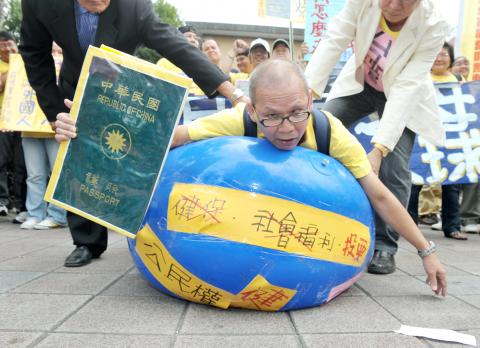About 50 members of a Filipino-Taiwanese group yesterday urged the government to grant them full-fledged citizenship, which they do not have despite being Republic of China (ROC) passport holders.
The members of the Concern Alliance for Filipino Chinese rallied outside the legislature, carrying signs and chanting slogans, such as “50 percent national,” to voice their dissatisfaction.
“Born and raised in the Philippines, these overseas Taiwanese do not carry the identification card that most ROC citizens have,” said Lorna Kung, a consultant for the alliance, who added that an identification card was a prerequisite to registering for national labor and health insurance.

Photo: CNA
The government has denied this group — labeled by the immigration law as “ROC nationals without citizenship” — identification cards since 1991, when it instituted tighter border controls.
The group said they are also required to apply for a visa to enter Taiwan, even though they are ROC passport holders.
“Why does an ROC national have to apply for a visa to enter the country? This is ridiculous,” Kung said.
Moreover, even after moving to Taiwan, these ROC passport holders must stay for seven years before they can apply for resident certificates and then wait another year before they can obtain identification cards, the alliance said.
It added that many of its members have to leave the country once every six months to maintain their legal residence status in Taiwan.
“We are Taiwanese. We are not foreigners,” some group members chanted.
They also urged lawmakers to pass amendments proposed by Chinese Nationalist Party (KMT) Legislator Cheng Li-wun (鄭麗文), who joined the rally to show her support.
The amendments would eliminate the visa requirement for Filipino Taiwanese with ROC passports and reduce the period before being able to apply for resident certificates to three years.
According to a government report issued in January, of the more than 60,000 ROC nationals without citizenship, more than 2,000 are Filipino Taiwanese.

Taiwan is to commence mass production of the Tien Kung (天弓, “Sky Bow”) III, IV and V missiles by the second quarter of this year if the legislature approves the government’s NT$1.25 trillion (US$39.78 billion) special defense budget, an official said yesterday. Commenting on condition of anonymity, a defense official with knowledge of the matter said that the advanced systems are expected to provide crucial capabilities against ballistic and cruise missiles for the proposed “T-Dome,” an advanced, multi-layered air defense network. The Tien Kung III is an air defense missile with a maximum interception altitude of 35km. The Tien Kung IV and V

The disruption of 941 flights in and out of Taiwan due to China’s large-scale military exercises was no accident, but rather the result of a “quasi-blockade” used to simulate creating the air and sea routes needed for an amphibious landing, a military expert said. The disruptions occurred on Tuesday and lasted about 10 hours as China conducted live-fire drills in the Taiwan Strait. The Civil Aviation Administration (CAA) said the exercises affected 857 international flights and 84 domestic flights, affecting more than 100,000 travelers. Su Tzu-yun (蘇紫雲), a research fellow at the government-sponsored Institute for National Defense and Security Research, said the air

A strong continental cold air mass is to bring pollutants to Taiwan from tomorrow, the Ministry of Environment said today, as it issued an “orange” air quality alert for most of the country. All of Taiwan except for Hualien and Taitung counties is to be under an “orange” air quality alert tomorrow, indicating air quality that is unhealthy for sensitive groups. In China, areas from Shandong to Shanghai have been enveloped in haze since Saturday, the ministry said in a news release. Yesterday, hourly concentrations of PM2.5 in these areas ranged from 65 to 160 micrograms per cubic meter (mg/m³), and pollutants were

Taiwan’s armed forces have established response protocols for a wide range of sudden contingencies, including the “Wan Chun Plan” to protect the head of state, the Ministry of Defense (MND) said today. After US President Donald Trump on Saturday launched a series of airstrikes in Venezuela and kidnapped Venezuelan President Nicolas Maduro, concerns have been raised as to whether China would launch a similar “decapitation strike” on Taiwan. The armed forces regularly coordinate with relevant agencies and practice drills to ensure preparedness for a wide range of scenarios, Vice Minister of National Defense Hsu Szu-chien (徐斯儉) told reporters before a